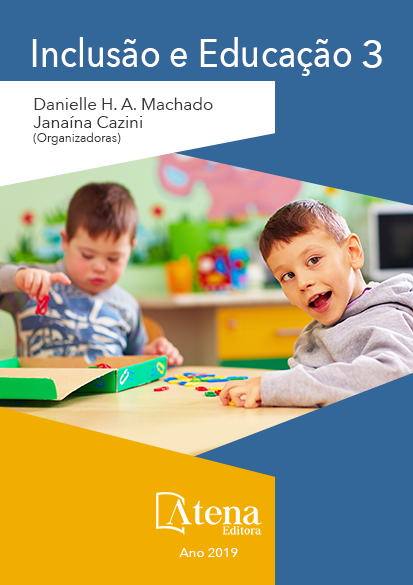
UMA ANÁLISE SOBRE A RELAÇÃO DE APEGO DE UMA CRIANÇA COM TEA NA EDUCAÇÃO INFANTIL
O presente estudo visa analisar
e investigar se há a possibilidade do
estabelecimento de relações socioafetivas,
mais precisamente, relações de apego por uma
criança diagnosticada com o Transtorno do
Espectro Autista (TEA), bem como investigar
a qualidade das relações socioafetivas
estabelecida por essa criança com seus
principais parceiros interacionais no contexto
escolar da Educação Infantil. Este trabalho tem
com base teórica os postulados deixados por
John Bowlby (1964/1984) referentes à Teoria
do Apego. Com base nessa teoria, o apego é
entendido como construído ao longo da primeira
infância, por meio das interações estabelecidas
pela criança com seus principais cuidadores.
Por essa razão, é que essa pesquisa constituise
como relevante devido ao contexto etário da
Educação Infantil, pois é nesse período, que
há a possibilidade de ebulição do fenômeno
do apego. Do ponto de vista metodológico,
trata-se de uma pesquisa qualitativa que se
desenvolveu através de um Estudo de Caso
do possível estabelecimento de relações de
apego construídas pela criança com TEA,
matriculada no 3º Ciclo de uma instituição
escolar da Educação Infantil pertencente à
rede privada de ensino da cidade do Recife-
PE. Os procedimentos metodológicos incluem
observações e registros videográficos do
cotidiano escolar vivenciado pela criança
em questão, bem como das relações que ela
estabelece durante o seu tempo na escola.
Os dados indicam que a criança com TEA em
questão, estabelece relação de apego com os
parceiros interacionais. Essas relações são
diferenciadas conforme a dinâmica relacional
co-construída pelos parceiros interacionais.
UMA ANÁLISE SOBRE A RELAÇÃO DE APEGO DE UMA CRIANÇA COM TEA NA EDUCAÇÃO INFANTIL
-
DOI: 10.22533/at.ed.31519150112
-
Palavras-chave: Autismo, Apego, Inclusão, Educação Infantil.
-
Keywords: Autism, Attachment, Inclusion, Early Childhood Education
-
Abstract:
This study aims at analyzing
and investigating the possibility of establishing
socio-affective relations, more precisely,
attachment relationships for a child diagnosed
with Autism Spectrum Disorder (ASD), as well
as investigating the quality of socio-affective
relationships established by this child with
their main interaction partners in the context
of Early Childhood Education. This work
has, theoretically, the postulates left by John
Bowlby (1964/1984) concerning the Theory of
Attachment. Based on this theory, attachment is understood as constructed throughout
early childhood, through the interactions established by the child with his or her primary
caregivers. For this reason, this research is relevant because of the age context of
Early Childhood Education, since it is in this period that there is the possibility of
boiling of the attachment phenomenon. From the methodological point of view, this
is a qualitative research that was developed through a Case Study of the possible
establishment of attachment relationships built by the child with ASD, enrolled in the
3rd Cycle of a school institution of Early Childhood Education belonging to the private
network of the city of Recife-PE. The methodological procedures include observations
and videographic records of the school life experienced by the child in question, as
well as the relationships she establishes during her time in school. The data indicate
that the child with ASD in question establishes an attachment relationship with the
interacting partners. These relationships are differentiated according to the relational
dynamics co-constructed by the interacting partners.
-
Número de páginas: 15
- VANESSA NICOLAU FREITAS DOS SANTOS


